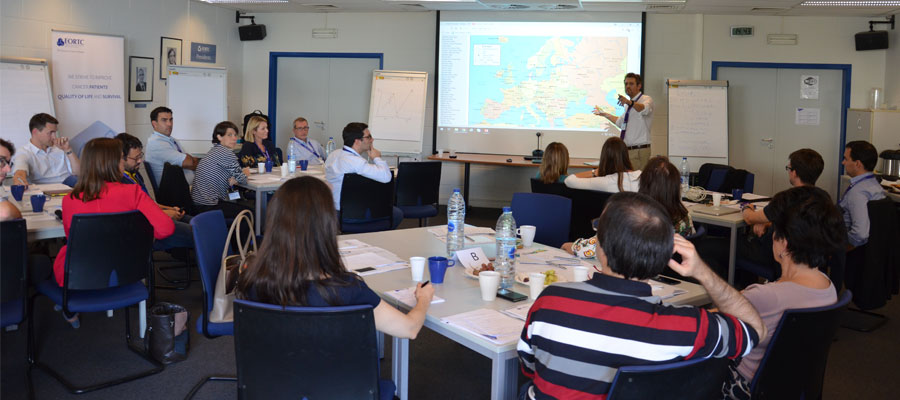Looking towards tomorrow – young clinical investigators lead the way
4 Oct 2018
EORTC looks to the future by encouraging early career investigators (ECIs) to get involved in its research networks. In this context, ‘early’ means someone who is finalising or who has just finalised training. Kim Aalders and Lizza Hendriks, both from The Netherlands, are ECIs in the breast and lung cancer groups respectively.
Kim is currently chair of the Young EORTC Breast Cancer Group. She is a medical doctor working in surgery, and divides her time between clinics and clinical research. « This includes a PhD focusing on factors relating to breast cancer recurrence, » she says. The Young Breast Cancer group has 92 members from 13 European countries.
Lizza is the « co-ordinator of the Young EORTC Lung Cancer Group. « I am a pulmonologist specialised in lung cancer care. In 2017, I started a year of research at the Institut Gustave Roussy, Villejuif, France, with a focus on brain metastases in NSCLC patients treated with immunotherapy. » The Young Lung Cancer Group has 43 members from 10 European countries.
Both ECIs believe that they have been given an exceptional opportunity to learn how to become future principal investigators. Young investigators will become senior investigators in the future, they feel, and that the chance the programme gives them to become a co-principal investigator with someone more senior is an excellent way to prepare themselves for this responsibility. « Attracting enthsiastic young members in order to have access to a strong European network is particularly important right now, when new treatments are becoming increasingly targeted to specific subsets of patients, » says Kim. « This means that trials are becoming more complex and that we need more than ever to work in an international context. »
« Furthermore, ECIs can sometimes think out of the box and provide a fresh input, » says Lizza. « And senior investigators do not always have the time to write a trial protocol or to perform a survey or systematic review. These are areas where we can both help and learn. »
Each new EORTC group trial under development is open for an ECI to join as a co-principal investigator. Such a person will help with the whole trajectory of the trial from the concept and writing of the protocol to the conduct and analysis of the study. ECIs are also encouraged to present their own trial ideas and, if the concept is endorsed by the group, a senior principal investigator is partnered with the ECI, rather than the other way round. «This gives us a great motivation to develop innovative trials, » says Kim.
Young investigators have already been involved in a plethora of EORTC activities via publications, the development of concepts, liaison with other areas (e.g. quality of life), and an annual meeting. They have an active presence on social media such as Facebook, LinkedIn and WhatsApp, and they also develop webinars and apps. In short, they do pretty much everything that senior investigators do, and more.
But even so, the ECIs feel that more can still be done. « During the last Breast Cancer Group meeting at EBCC 2018 in Barcelona, we suggested that young investigators should be able to apply for sponsorship for training organised by EORTC, such as the statistics course, as well as attendance at the survivorship summit, the Innovation and Biomarkers in Cancer Drug Development meeting, and educational meetings that they would not be able to attend without funding, » says Kim.
Lizza agrees that more support is needed. « Many ECIs don’t have the means to go to meetings, and grants would help them to do this, and additionally give the the chance to present their EORTC-related abstracts at conferences. We also need to have more publicity about the opportunities for those who are not yet in the scheme, especially those who have very little research experience but who are motivated and willing to learn. »
Watch this space for the future of these enthusiastic and motivated researchers !
Related News
EORTC: Advancing research and treatment for rare cancers
29 Feb 2024
EORTC Fellowship Programme: celebrating more than 20 years of impactful collaboration
22 Feb 2024
Appointment of Malte Peters as EORTC Strategic Alliance Officer
9 Feb 2024
Unique series of workshops in partnership with the European Medicines Agency (EMA)
7 Feb 2024
EORTC launches a prominent clinical trial in older patients with locally advanced (LA) HNSCC (Head and Neck Squamous Cell Carcinoma)
14 Dec 2023
Seven IMMUcan abstracts selected for ESMO Immuno-Oncology Congress 2023
6 Dec 2023
EORTC Quality of Life measures integrated in CDISC
20 Nov 2023
EORTC and Immunocore are collaborating to launch the ATOM clinical trial of tebentafusp in Adjuvant Uveal Melanoma
7 Nov 2023
Treatment with decitabine resulted in a similar survival and fewer adverse events compared with conventional chemotherapy in older fit patients with acute myeloid leukaemia
31 Oct 2023
New results and forthcoming EORTC trials in rare cancers, lung, head and neck, and breast carcinomas presented at ESMO 2023
20 Oct 2023


